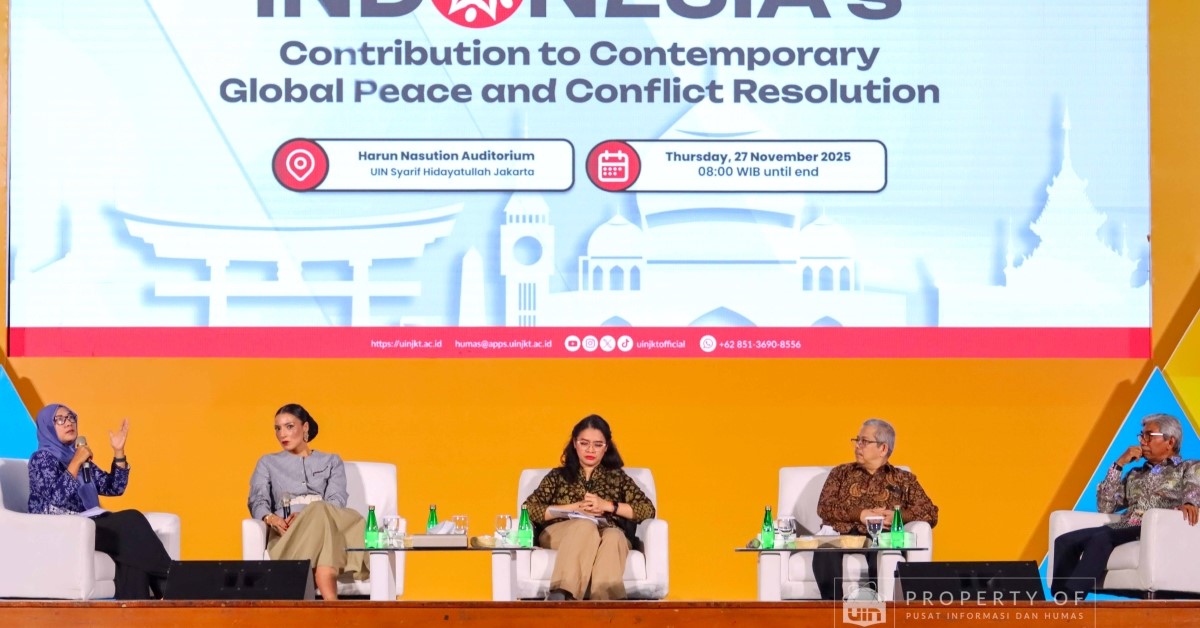Scholars Discuss Indonesia’s Impact on Global Peace Efforts at UIN Jakarta Forum
Harun Nasution Auditorium, UIN Online News — Syarif Hidayatullah State Islamic University Jakarta hosted an international seminar titled “Indonesia’s Contribution to Contemporary Global Peace and Conflict Resolution”, featuring four speakers ranging from national to international expertise on Thursday (27/11/2025).
The event spotlighted Indonesia’s evolving role in advancing peacekeeping and conflict mediation, serving as a platform for strengthening academic insight and practical understanding of Indonesia’s diplomatic relation to the global community.
Four invited panelists contributed to the discussion:
- Dr. H. Abdurrahman M. Fachir, Indonesian diplomat and former Deputy Minister of Foreign Affairs of the Republic of Indonesia (2014–2019)
- Rizal Sukma, Ph.D., Member of the Advisory Board of the International Institute for Democracy and Electoral Assistance (IDEA)
- Dinna Prapto Raharja, Ph.D., International Affairs Analyst, Binus University
- Malika Ouacha, Ph.D., Assistant Professor, University of Indianapolis
Opening the session, Malika Ouacha reflected on patterns of global media framing in reporting international affairs by highlighting Indonesia’s prominent diplomatic influence in discussions about Gaza's independence.
“Propelled by its long peacekeeping record, Muslim majority identity, and the rare legitimacy it holds across nations that seldom agree,” she stated.
She cited misinformation in global coverage of the Palestinian conflict, noting that Indonesia’s approach grounded in religious plurality and a consistent diplomatic ethic while offering a constructive alternative at the same time.
From a Western perspective, she continued, Palestine is often portrayed as exclusively Muslim, which distorts reality. In fact, Palestine is home to Muslims, Christians, and Jews who historically lived together in peace for centuries.
Speaking next, Dr. Abdurrahman M. Fachir explained that Indonesia’s very foundation is built upon peace and justice. Only from capacity, recognition, and universal values can a country stands its sovereignty.
“When we speak of humanity, we speak of justice. Hence we must speak of independence absolutely,” he argued.
He reiterated that mediation requires organizational strength and the ability to stay connected with all nations regardless of their power and autonomy.
“Despite your disagreement, you must maintain good relations and communication with every block. Best of both world it is,” he conveyed.
Continuing the session, Rizal Sukma, Ph.D. argued that peacebuilding is reached though it requires every nations to preserved and actively involved in the process.
“It is not merely peacekeeping,” he explained. “Those who actually knows about diplomatic would understand how wide the conceptual spectrum is, from peacebuilding to long-term maintenance.”
Dinna Prapto Raharja, Ph.D. encouraged students to view peace as the highest expression of community resilience. She highlighted Indonesia’s historical engagement in international diplomacy despite its status as a middle-income nation.
“My key point is that Indonesia, even as a middle-income country, has long been recognized internationally for its solidarity,” she explained.
(Meisa Aqila N.H/Fauziah M,/Zaenal M./Muhamad Arifin Ilham/Photo: Aqilah Qurratulaini)

